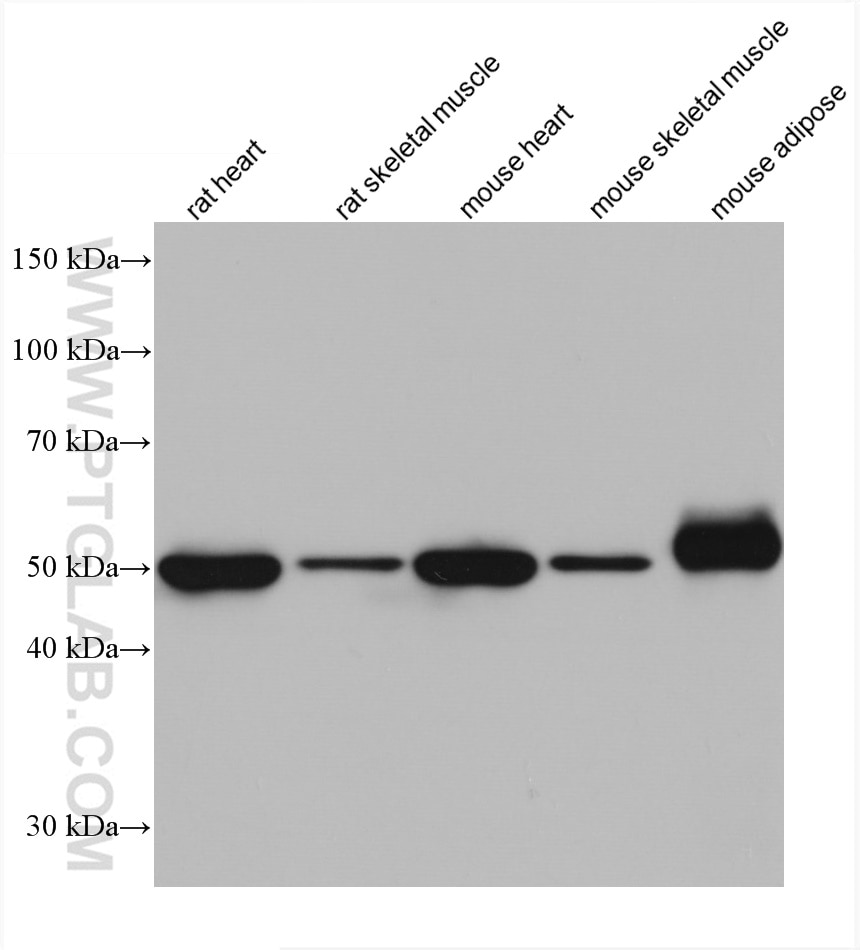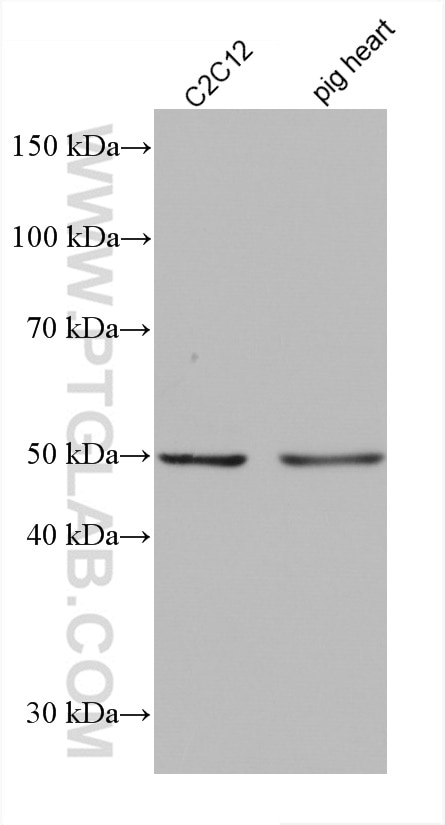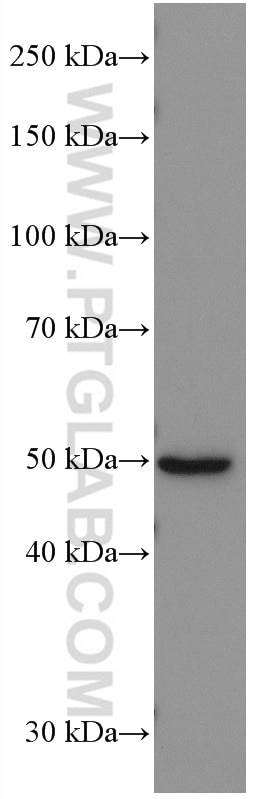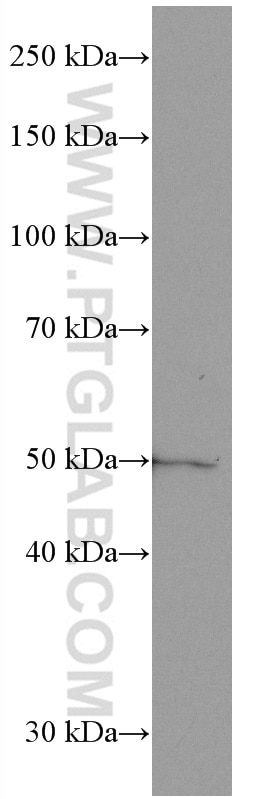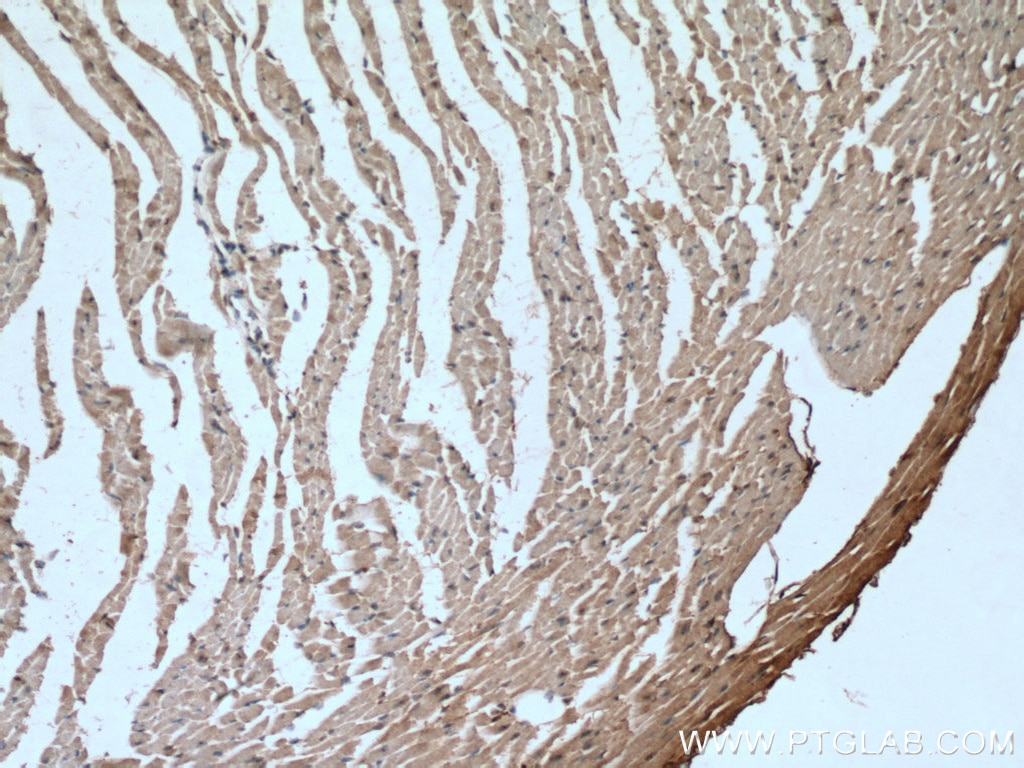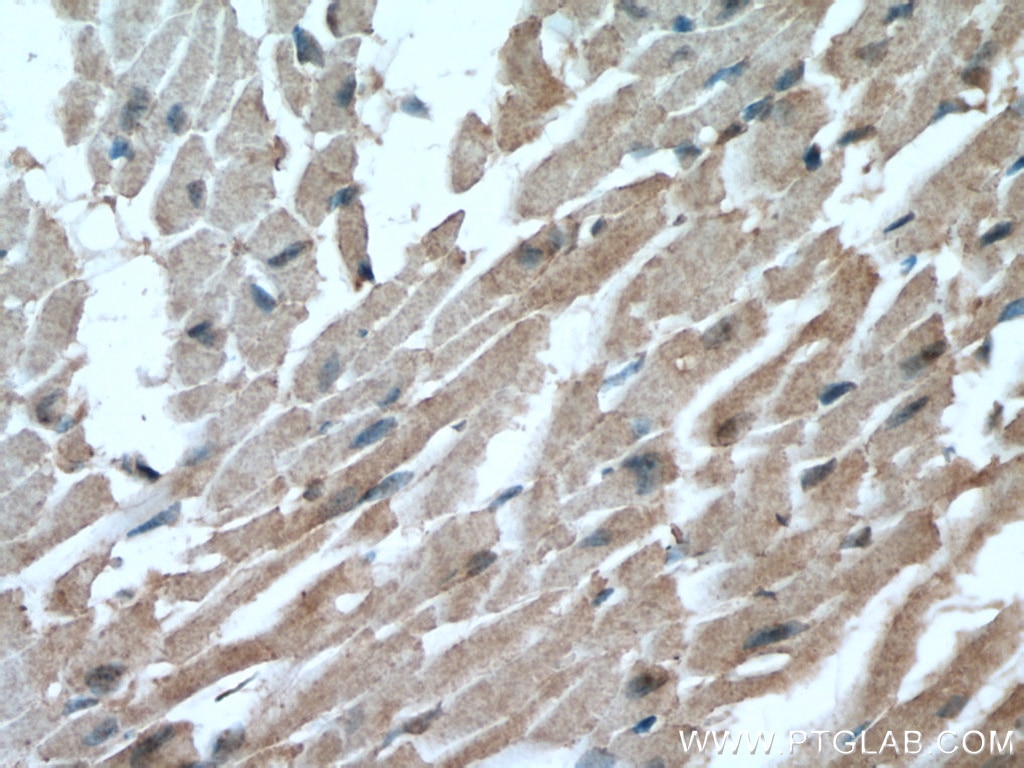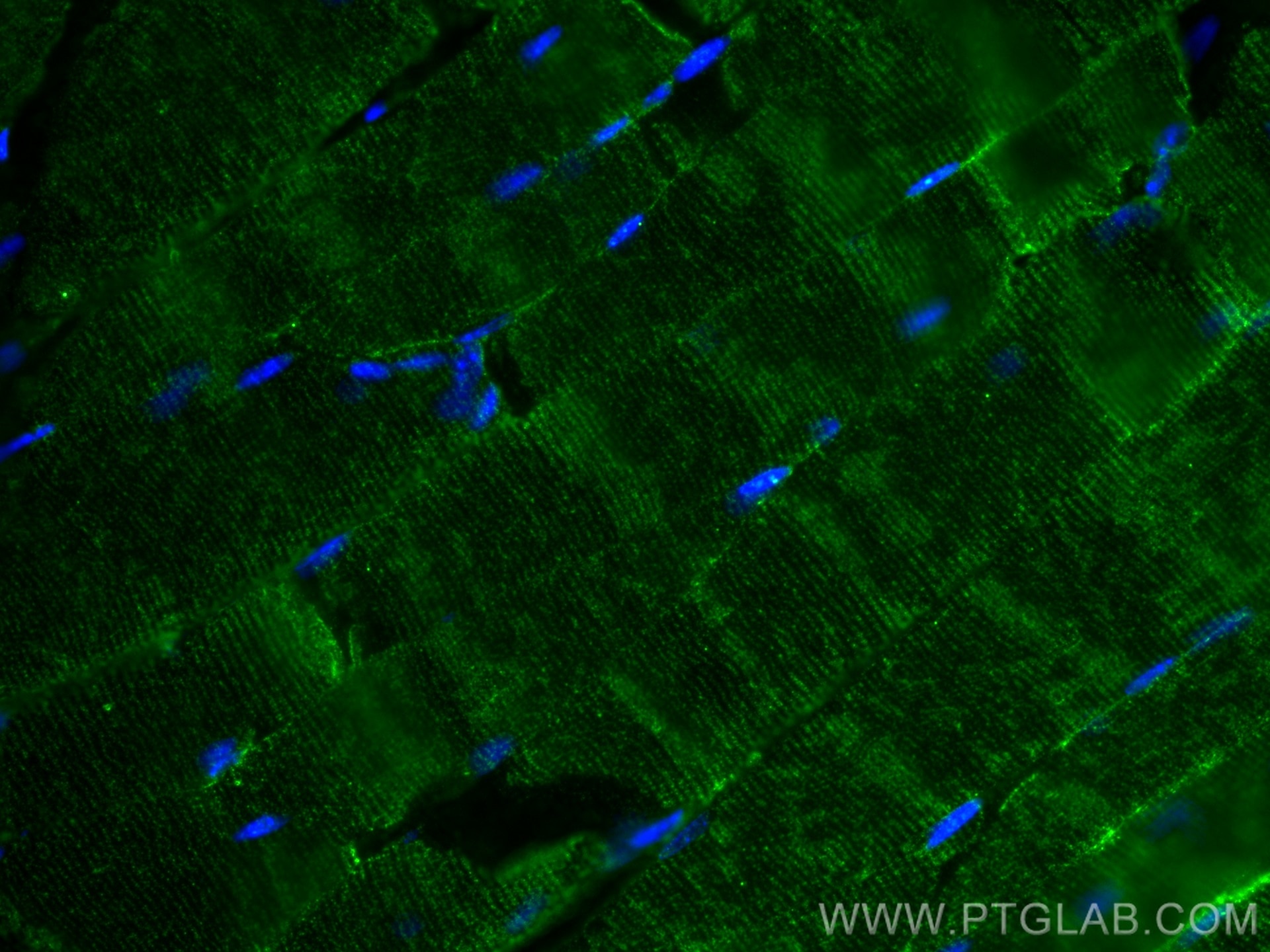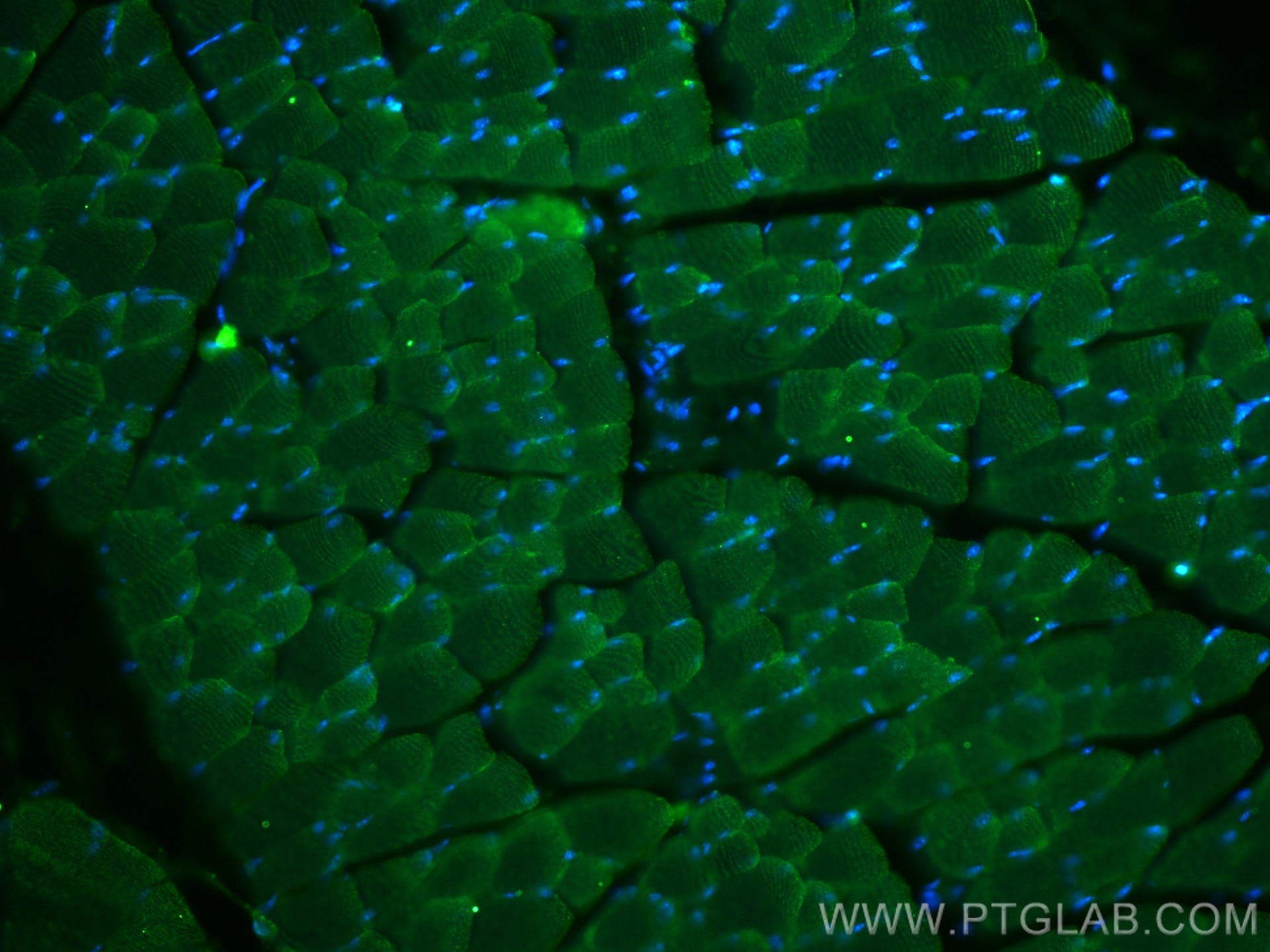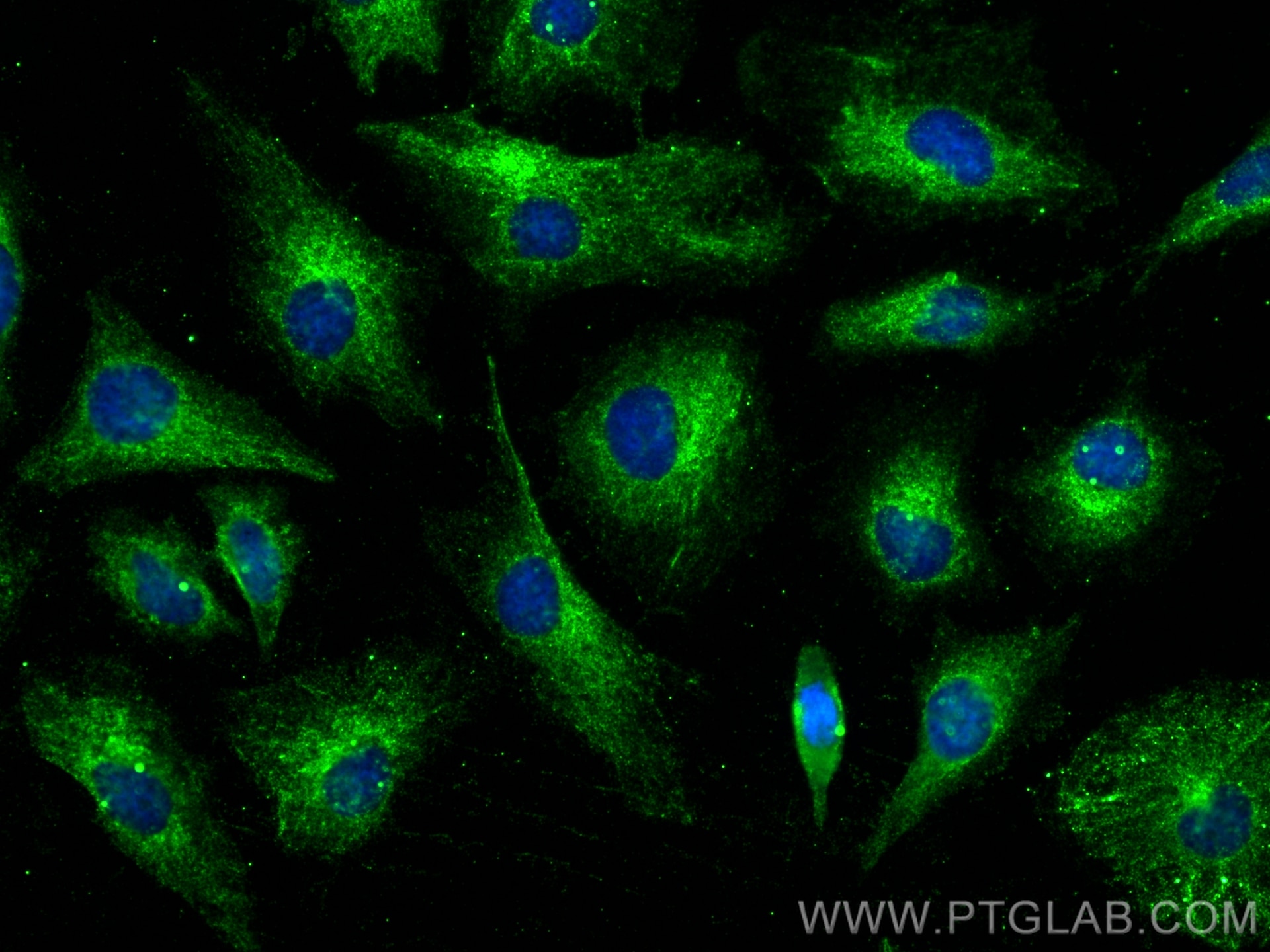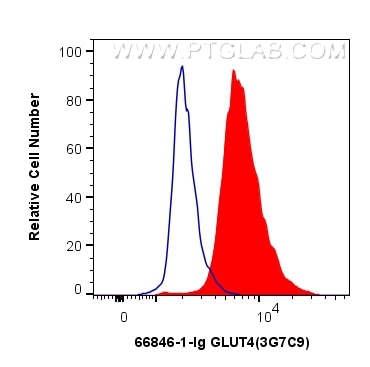Tested Applications
| Positive WB detected in | rat heart tissue, human heart tissue, C2C12 cells, human skeletal muscle tissue, rat skeletal muscle tissue, mouse heart tissue, mouse skeletal muscle tissue, mouse adipose tissue, pig heart tissue |
| Positive IHC detected in | mouse heart tissue Note: suggested antigen retrieval with TE buffer pH 9.0; (*) Alternatively, antigen retrieval may be performed with citrate buffer pH 6.0 |
| Positive IF-P detected in | mouse skeletal muscle tissue |
| Positive IF/ICC detected in | HeLa cells |
| Positive FC (Intra) detected in | HEK-293 cells |
Recommended dilution
| Application | Dilution |
|---|---|
| Western Blot (WB) | WB : 1:1000-1:3000 |
| Immunohistochemistry (IHC) | IHC : 1:50-1:500 |
| Immunofluorescence (IF)-P | IF-P : 1:200-1:800 |
| Immunofluorescence (IF)/ICC | IF/ICC : 1:200-1:800 |
| Flow Cytometry (FC) (INTRA) | FC (INTRA) : 0.40 ug per 10^6 cells in a 100 µl suspension |
| It is recommended that this reagent should be titrated in each testing system to obtain optimal results. | |
| Sample-dependent, Check data in validation data gallery. | |
Published Applications
| WB | See 115 publications below |
| IHC | See 9 publications below |
| IF | See 13 publications below |
Product Information
66846-1-Ig targets GLUT4 in WB, IHC, IF/ICC, IF-P, FC (Intra), ELISA applications and shows reactivity with human, mouse, rat, pig samples.
| Tested Reactivity | human, mouse, rat, pig |
| Cited Reactivity | human, mouse, rat, pig, zebrafish, hamster |
| Host / Isotype | Mouse / IgG2b |
| Class | Monoclonal |
| Type | Antibody |
| Immunogen |
CatNo: Ag15390 Product name: Recombinant human GLUT4 protein Source: e coli.-derived, PGEX-4T Tag: GST Domain: 228-292 aa of BC069615 Sequence: RYLYIIQNLEGPARKSLKRLTGWADVSGVLAELKDEKRKLERERPLSLLQLLGSRTHRQPLIIAV Predict reactive species |
| Full Name | solute carrier family 2 (facilitated glucose transporter), member 4 |
| Calculated Molecular Weight | 509 aa, 55 kDa |
| Observed Molecular Weight | 48-50 kDa |
| GenBank Accession Number | BC069615 |
| Gene Symbol | GLUT4 |
| Gene ID (NCBI) | 6517 |
| RRID | AB_2882186 |
| Conjugate | Unconjugated |
| Form | Liquid |
| Purification Method | Protein A purification |
| UNIPROT ID | P14672 |
| Storage Buffer | PBS with 0.02% sodium azide and 50% glycerol, pH 7.3. |
| Storage Conditions | Store at -20°C. Stable for one year after shipment. Aliquoting is unnecessary for -20oC storage. 20ul sizes contain 0.1% BSA. |
Background Information
Glucose transporter 4 (GLUT4), also known as solute carrier family 2, facilitated glucose transporter member 4 (SLC2A4), is a transporter protein regulating glucose transport across cell membranes in an INS-dependent manner.
What is the molecular weight of GLUT4? Is GLUT4 post-translationally modified?
The molecular weight of GLUT4 transporter is 55 kDa. GLUT4 can be N-glycosylated, which is important for its stability and trafficking between the recycling compartment and plasma membrane (PMID: 21757715 and 22545627), and it can also be ubiquitinated and phosphorylated (PMID: 23665900).
What is the subcellular localization of GLUT4?
Glucose transporters, including GLUT4, are multiple-pass integral membrane proteins. GLUT4 is present at the plasma membrane but is also a subject of recycling between plasma membrane and endosomes. The localization of GLUT4 depends on stimulation with INS - in basal conditions GLUT4 is retained intracellularly, while upon INS stimulation it is translocated to the plasma membrane (PMID: 18570632).
What molecules can be transported by GLUT4?
Although the main substrate of GLUT4 transport is glucose, it can also transport glucosamine.
What is the tissue expression pattern of GLUT4?
GLUT4 is expressed in white and brown adipose tissue and in muscle and heart cells, where it is the main glucose transporter responsible for peripheral glucose uptake in response to INS.
Which cell lines can be used to study insulin-dependent GLUT4 protein translocation in glucose uptake assays?
Fat and muscle cells are primarily used in glucose uptake assays because they physiologically respond to INS(PMID: 26646194). The most commonly used cell lines are 3T3-L1 cells (murine pre-adipose fibroblasts), L6 cells (rat myoblasts), and C2C12 cells (murine myoblasts).
Protocols
| Product Specific Protocols | |
|---|---|
| FC protocol for GLUT4 antibody 66846-1-Ig | Download protocol |
| IF protocol for GLUT4 antibody 66846-1-Ig | Download protocol |
| IHC protocol for GLUT4 antibody 66846-1-Ig | Download protocol |
| WB protocol for GLUT4 antibody 66846-1-Ig | Download protocol |
| Standard Protocols | |
|---|---|
| Click here to view our Standard Protocols |
Publications
| Species | Application | Title |
|---|---|---|
Cell Metab Di-methylation of CD147-K234 Promotes the Progression of NSCLC by Enhancing Lactate Export. | ||
Adv Sci (Weinh) NAT10/ac4C/FOXP1 Promotes Malignant Progression and Facilitates Immunosuppression by Reprogramming Glycolytic Metabolism in Cervical Cancer | ||
J Pineal Res Melatonin increases susceptibility to atrial fibrillation in obesity via Akt signaling impairment in response to lipid overload | ||
Int J Biol Macromol Lycium barbarum polysaccharide mitigates high-fat-diet-induced skeletal muscle atrophy by promoting AMPK/PINK1/Parkin-mediated mitophagy | ||
Oncogene Programmed death ligand 1 promotes lymph node metastasis and glucose metabolism in cervical cancer by activating integrin β4/SNAI1/SIRT3 signaling pathway. | ||
Oxid Med Cell Longev Protective Effect of Jiang Tang Xiao Ke Granules against Skeletal Muscle IR via Activation of the AMPK/SIRT1/PGC-1α Signaling Pathway. |
Reviews
The reviews below have been submitted by verified Proteintech customers who received an incentive for providing their feedback.
FH Boyan (Verified Customer) (11-25-2024) | recognized a protein at the expected size
|
FH Hua (Verified Customer) (09-07-2023) | Good antibody for WB. Signal is strong, and the background is clean. It seems not work with GLUT4 of mouse origin.
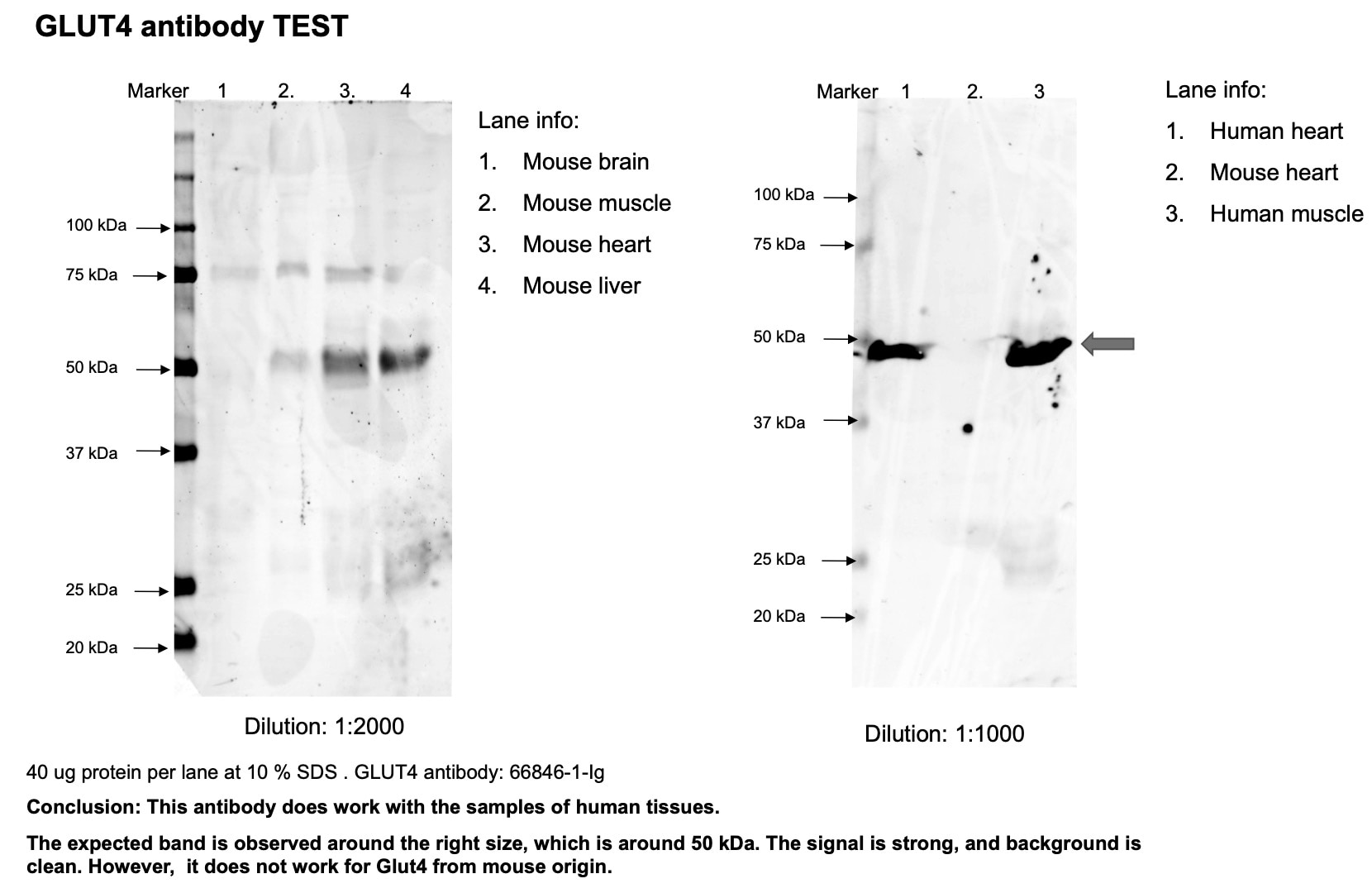 |

